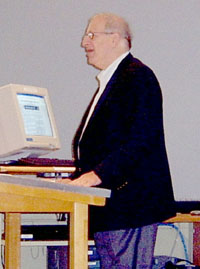
|
|
A Summary from the CTC VISTA Project Pre-service Orientation for new VISTAs and Supervisors, August 31, 2005
Ed Schwartz: Community Organizing and Development
(see Focusing the Work of CTC VISTA Projects—Priority Area Presentations)  Ed Schwartz. Ed Schwartz, author of NetActivism: How Citizens Use the Internetand founder/director of the Institute for Study of Civic Values, broaches the massive amount of information in the context of the Institute's mission of “demonstrating …how to build community and examine public policy within the framework of principles set forth in the Declaration of Independence and the Preamble to the Constitution.” Given this framework, Ed has designed the Neighborhoods Online website as an accessible doorway for concerned citizens to enter the wide web world of civic information. It is not only an easy-to-navigate gateway to the enormous amount of usually cumbersome civic and government websites, but it is also a resource organized specifically for civic organizing and activism by blocks, neighborhoods, and cities. Phillyneighborhoods.org is the richest example of its application, filled with resources for community activists and projects that Ed has been involved with for so many years in his own hometown. Using a handy set of top “ten websites to profile a community” (see sidebar), Ed shows how the information can be reorganized for local organizing purposes, including demonstrating the local extent and effect of budget cuts in federal programs that often seem so distant and unrelated to actual lives.Phillyneighborhoods.org has information organized for blocks and neighborhoods with the goal of helping to educate and organize interested citizens around issues such as safety in schools and the cost of crime. It has menu options and content areas in housing, crime, education, jobs, recreation, health, and human services. This kind of portal is a unique resource for citizens scanning the enormous amount of unorganized community information that is often untapped through the Internet because it is so hard to find and not organized or formatted for civic engagement and community development purposes. The Institute's recently-launched Ten Point Civic Value Campaign is aimed at helping neighborhood organizations work with government and schools to strengthen civic values and resources in these areas. By using tools such as Neighborhoods Online, citizens can be galvanized to “make government work” and use available data to profile their own communities and support campaigns to improve local schools, businesses and street corners. —Danielle Martin Hyperlinks references in this article: Comments
|